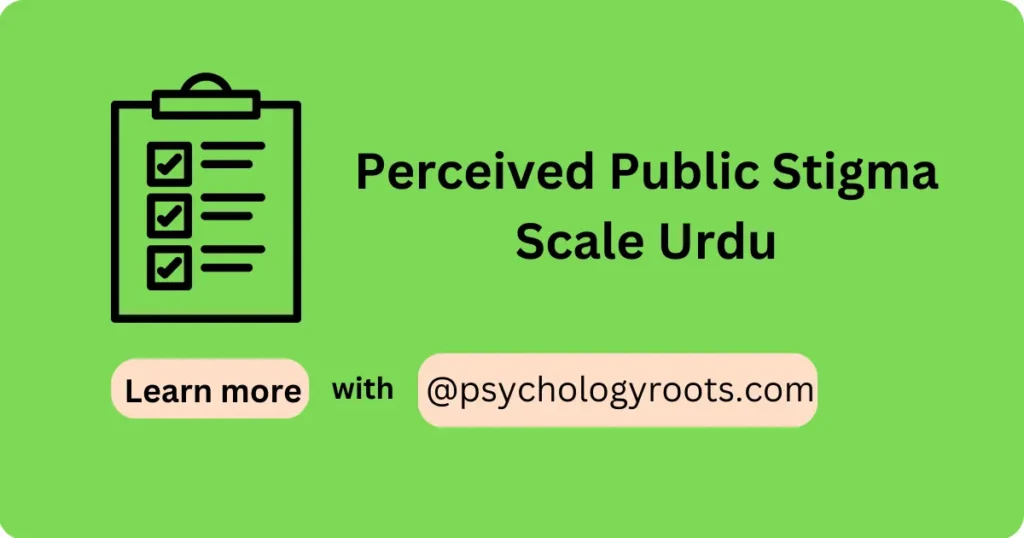Table of Contents
Perceived Public Stigma Scale Urdu
Here in this post, we are sharing the “Perceived Public Stigma Scale Urdu”. You can read psychometric and Author information. We have thousands of Scales and questionnaires in our collection (See Scales and Questionnaires). You can demand us any scale and questionnaires related to psychology through our community, and we will provide you with a short time. Keep visiting Psychology Roots.
About Scale Name
Scale Name
Perceived Public Stigma Scale Urdu
Author Details
Searching for confirmation
Translation Availability
Not Sure

Background/Description
The Perceived Public Stigma Scale (PSS) is a 12-item self-report measure that assesses the extent to which individuals believe that others will devalue or discriminate against them because of their mental illness. The scale has been used in numerous studies to measure perceived stigma among people with mental illness.
The PSS items are scored on a 4-point Likert scale, ranging from 1 (strongly disagree) to 4 (strongly agree). The total score ranges from 12 to 48, with higher scores indicating greater perceived stigma. The PSS has good psychometric properties, with a Cronbach’s alpha of 0.82.
The PSS was developed in the context of the social-constructivist model of stigma, which posits that stigma is a social construct that is created and maintained by society. The model suggests that stigma is not simply a matter of individual attitudes, but is also influenced by social factors such as cultural beliefs, media representations, and institutional practices.
The PSS has been used to study the impact of stigma on a variety of outcomes, including help-seeking behavior, self-esteem, and quality of life. The scale has also been used to identify factors that are associated with perceived stigma, such as the severity of the mental illness, the individual’s social support, and the level of knowledge about mental illness.
The PSS is a valuable tool for measuring perceived stigma among people with mental illness. It can be used to assess the impact of stigma on individuals’ lives and to identify interventions that can reduce stigma.
Administration, Scoring and Interpretation
The Perceived Public Stigma Scale (PSS) can be administered by a researcher or clinician. The following are the steps involved in administering the PSS:
- The researcher or clinician should explain the purpose of the PSS to the participant and obtain their consent to participate.
- The participant should be given a copy of the PSS and asked to read each item carefully.
- The participant should then rate their agreement with each item on a 4-point Likert scale, ranging from 1 (strongly disagree) to 4 (strongly agree).
- The participant should complete the PSS in private.
- The researcher or clinician should collect the PSS from the participant.
Reliability and Validity
Not Available
Available Versions
12-Items
Reference
Still searching
Important Link
Scale File:
Frequently Asked Questions
What is the PSS?
The PSS is a 12-item self-report measure that assesses the extent to which individuals believe that others will devalue or discriminate against them because of their mental illness.
How is the PSS scored?
The PSS items are scored on a 4-point Likert scale, ranging from 1 (strongly disagree) to 4 (strongly agree). The total score ranges from 12 to 48, with higher scores indicating greater perceived stigma.
What are the factors that influence PSS scores?
The PSS scores can be influenced by a number of factors, including the severity of the mental illness, the individual’s social support, and the level of knowledge about mental illness.
How can the PSS be used?
The PSS can be used to assess the impact of stigma on individuals’ lives and to identify interventions that can reduce stigma.
Disclaimer
Please note that Psychology Roots does not have the right to grant permission for the use of any psychological scales or assessments listed on its website. To use any scale or assessment, you must obtain permission directly from the author or translator of the tool. Psychology Roots provides information about various tools and their administration procedures, but it is your responsibility to obtain proper permissions before using any scale or assessment. If you need further information about an author’s contact details, please submit a query to the Psychology Roots team.
Help Us Improve This Article
Have you discovered an inaccuracy? We put out great effort to give accurate and scientifically trustworthy information to our readers. Please notify us if you discover any typographical or grammatical errors.
Make a comment. We acknowledge and appreciate your efforts.
If you have any scale or any material related to psychology kindly share it with us at psychologyroots@gmail.com. We help others on behalf of you.